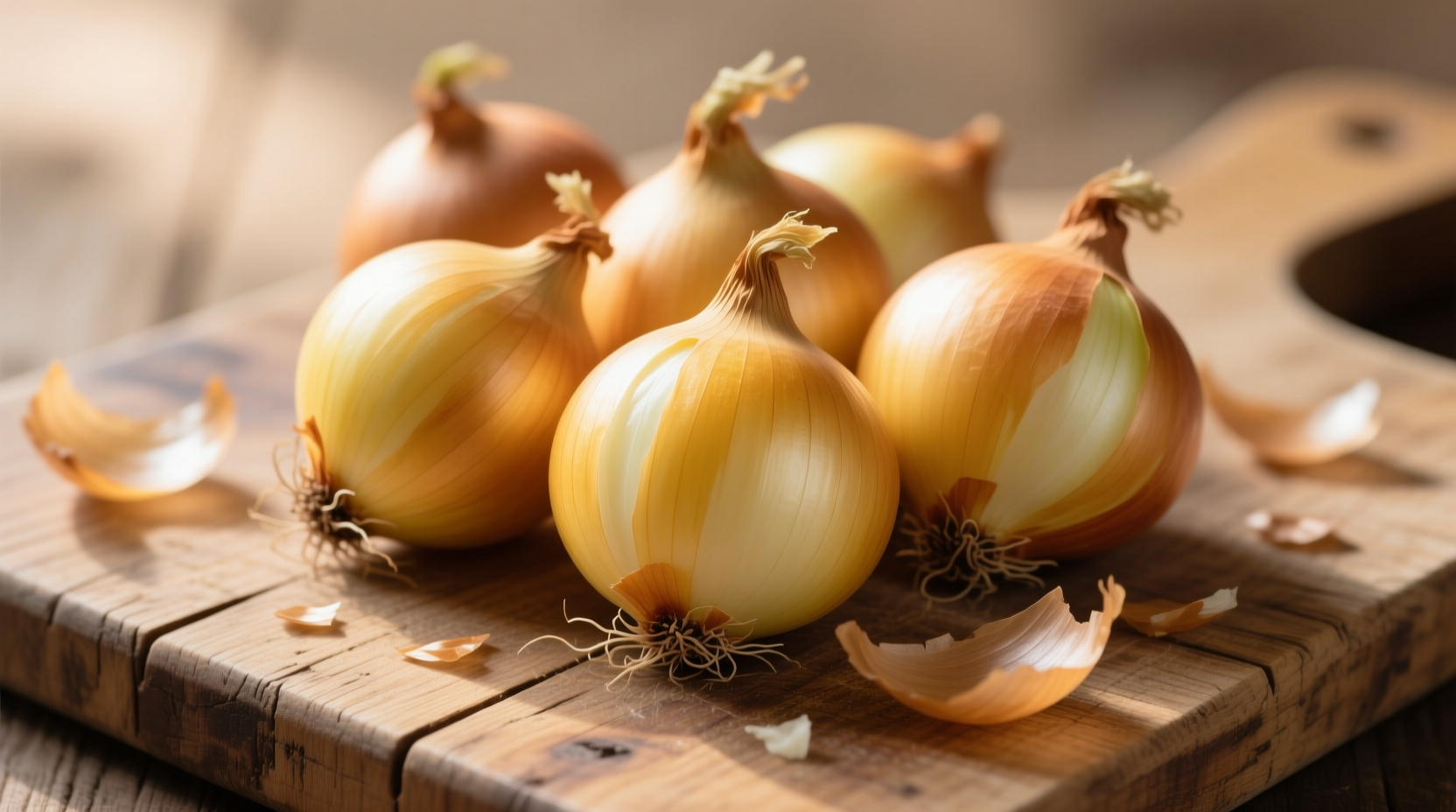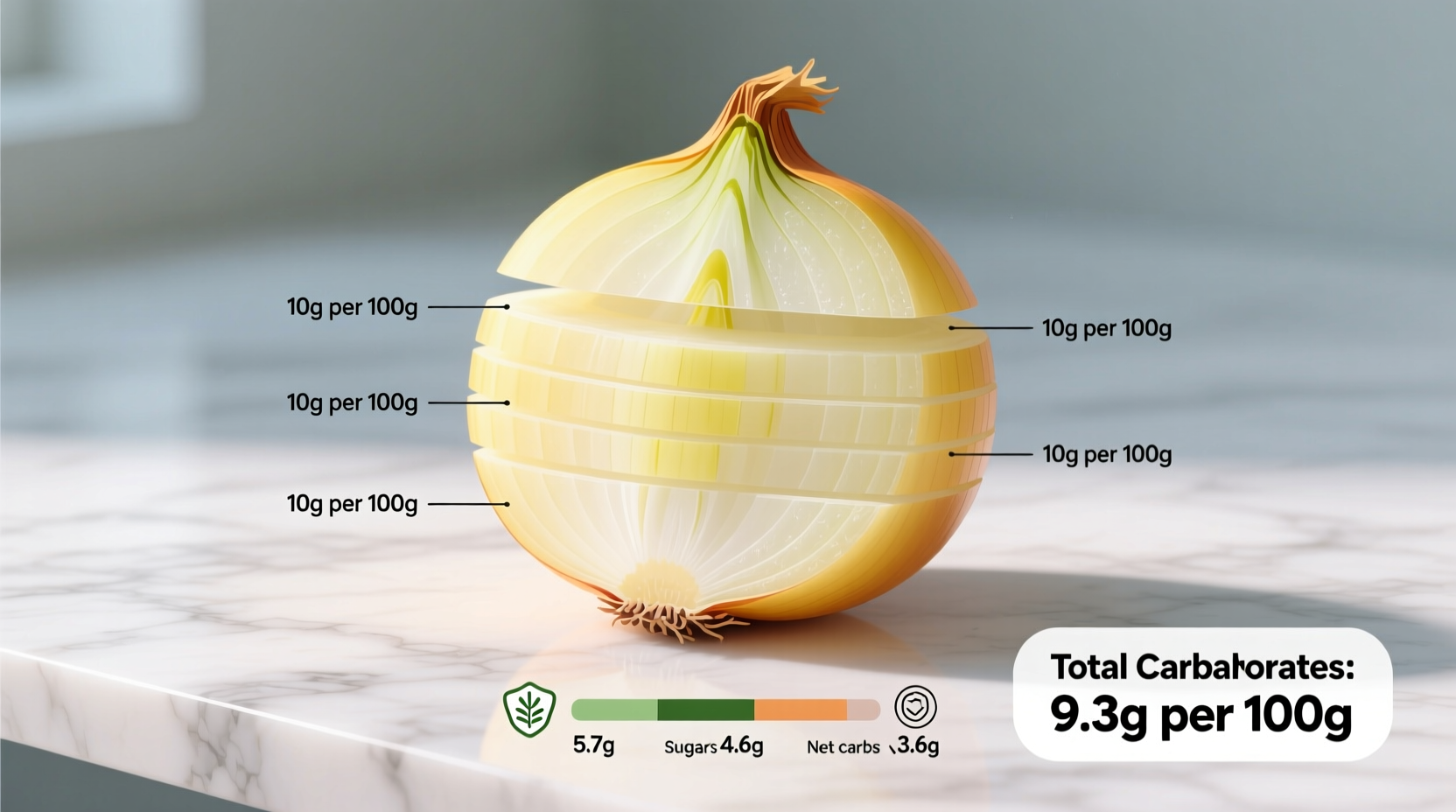Understanding the precise carbohydrate content in onions helps home cooks and health-conscious eaters make informed decisions. Whether you're managing diabetes, following a low-carb diet, or simply tracking your nutritional intake, knowing exactly what's in your food matters. Let's break down the numbers and explore how onions fit into various dietary approaches.
Breaking Down Onion Carbohydrates: The Complete Picture
When examining onion nutrition, it's essential to distinguish between total carbohydrates and their components. The carbohydrate profile varies slightly depending on onion variety and preparation method. Here's a detailed nutritional breakdown per 100 grams of raw onion:
| Onion Type | Total Carbs (g) | Dietary Fiber (g) | Sugars (g) | Net Carbs (g) |
|---|---|---|---|---|
| Yellow Onion (raw) | 9.3 | 1.7 | 4.2 | 7.6 |
| Red Onion (raw) | 9.5 | 2.0 | 4.3 | 7.5 |
| White Onion (raw) | 9.0 | 1.6 | 4.0 | 7.4 |
| Green Onions (raw) | 7.3 | 2.6 | 3.9 | 4.7 |
| Caramelized Onion (per 1/4 cup) | 8.0 | 1.0 | 5.0 | 7.0 |
Data sourced from the USDA FoodData Central database, the most current and comprehensive nutritional resource available. Notice how cooking methods affect carbohydrate composition—caramelization concentrates natural sugars while reducing water content.
Why Onion Carbohydrate Content Matters for Your Diet
For those monitoring carbohydrate intake, understanding onion's nutritional profile helps make strategic cooking decisions. A single medium onion represents approximately 3% of the recommended daily carbohydrate intake for a 2,000-calorie diet. But context matters—here's how onions function within different dietary frameworks:
- Low-carb diets: One small onion (70g) contains about 6.5g net carbs, fitting comfortably within most moderate low-carb plans
- Keto considerations: While onions aren't keto-friendly in large quantities, using 1-2 tablespoons of finely diced onion adds flavor without significantly impacting carb counts
- Diabetes management: Onions have a low glycemic load (GL=1 for 1/2 cup) due to their fiber content slowing sugar absorption
- Weight management: With only 40 calories per medium onion, they add volume and flavor without excessive energy density
Registered dietitians often recommend keeping onion portions to 1/4 to 1/2 cup when following strict carbohydrate-controlled diets, as this provides flavor complexity while maintaining dietary goals.

Practical Applications: Using Onion Carbs to Your Advantage
Professional chefs and nutrition-savvy home cooks leverage onion carbohydrates strategically. Here's how to maximize flavor while managing carb intake:
Flavor Maximization with Minimal Carbs
Finely mince onions and use them as a flavor base in dishes where you'll strain or remove solids. This technique infuses soups, stews, and sauces with onion essence while significantly reducing actual carb consumption. For example, simmering whole onions in broth for 20 minutes then removing them adds depth without adding measurable carbohydrates to your final dish.
Varietal Selection for Carb-Conscious Cooking
Not all onions are created equal when monitoring carbohydrates. Green onions offer the lowest net carb profile (4.7g per 100g) while providing similar flavor compounds. When following strict low-carb protocols, substituting 2 parts green onions for 1 part yellow onion maintains flavor intensity with fewer carbohydrates.
Cooking Methods That Transform Carbohydrates
The way you prepare onions dramatically affects their carbohydrate profile. Slow caramelization converts some complex carbohydrates into simpler sugars, increasing sweetness while reducing overall volume. Conversely, quick sautéing preserves more fiber content. For blood sugar management, lightly cooked onions maintain more resistant starches that function as prebiotic fiber.
Special Considerations for Different Dietary Needs
Certain health conditions require more nuanced understanding of onion carbohydrates. The FODMAP content in onions affects some individuals differently than the standard carbohydrate count suggests.
According to Monash University's low-FODMAP research, small servings of onion (about 30g or 1/4 cup) contain moderate levels of fructans that many people with IBS can tolerate. However, larger portions quickly become high-FODMAP, potentially causing digestive discomfort regardless of total carbohydrate count.
For those following therapeutic diets like Specific Carbohydrate Diet (SCD) or Gut and Psychology Syndrome (GAPS) protocols, onions present an interesting case. While technically allowed in limited quantities, their complex carbohydrate structure requires healthy gut bacteria for proper digestion—something compromised in certain digestive conditions.
Putting Onion Carbs in Context: Beyond the Numbers
When evaluating onion carbohydrates, consider the complete nutritional package. Onions provide significant amounts of vitamin C, chromium, and quercetin—a flavonoid with potent antioxidant properties. Research published in the Journal of Agricultural and Food Chemistry shows that quercetin content actually increases when onions are cooked, potentially offsetting some carbohydrate concerns through enhanced nutritional benefits.
The natural sugars in onions also serve functional purposes in cooking beyond mere carbohydrate content. They facilitate the Maillard reaction, creating complex flavor compounds during cooking that can reduce the need for added sugars or fats in recipes. This makes onions a valuable tool for creating satisfying dishes within various dietary constraints.
Common Questions About Onion Carbohydrates
Let's address some frequently asked questions about onion carbohydrate content to help you make informed dietary choices.











 浙公网安备
33010002000092号
浙公网安备
33010002000092号 浙B2-20120091-4
浙B2-20120091-4